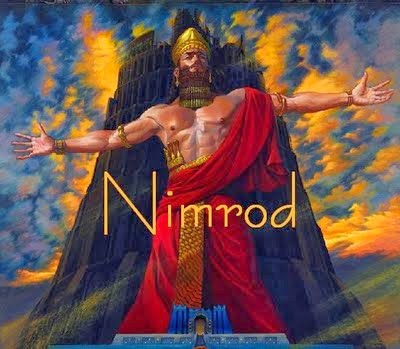THE SPIRIT OF NIMROD
THE SEED
“And Cush begat Nimrod: he began to be a mighty one in the earth. He was a mighty hunter before the Lord: wherefore it is said, Even as Nimrod the mighty hunter before the Lord.” Genesis 10:8–9 (KJV)
Nimrod was described as a mighty man; strong, influential, and ambitious. But his legacy was not one of godliness. Rather, he became a symbol of pride, rebellion, and self-exaltation. The spirit of Nimrod is not just about strength or leadership, it is about building without God, leading for self-glory, and exalting personal ambition above divine purpose. This same spirit still operates today. It manifests in the desire to create our paths without
acknowledging God, to build “towers” of success, fame, or influence for our name, just as Nimrod led the building of Babel (Genesis 11:4). But God opposes the proud and blesses the humble. Anything built outside His will may stand for a season, but it will not last. As believers, we are called to reject the spirit of Nimrod and embrace the Spirit of Christ; one of humility, obedience, and total dependence on God. Rather than building monuments to ourselves, we must be committed to building altars for God’s glory. Let God be the centre of all you do. Seek to lift His name, not yours. When the desire to prove yourself rises, pause and ask: Is this for God’s glory, or mine? Let your life be a testimony of surrender, not self-promotion.
BIBLE READING: Genesis 11:1–9
PRAYER: Father, deliver me from every prideful ambition and desire for self-glory. Help me to build only what You’ve commissioned and to live a life that exalts Your name above mine. Amen.
ÈMÍ NÍMÚRÓDÙ IRUGBIN NAA
“Kuṣi si bi Nimurodu: o si bẹ̀rẹ si di alagbara li aiye: O si jẹ ọdẹ nla niwaju Oluwa: nitorina li a ṣe nwipe, Gẹgẹ bi Nimrodu ọdẹ nla niwaju Oluwa.” Jẹ́nẹ́sísì 10:8-9
Nimrod ni a ṣe apejuwe bi ọkunrin alagbara; akoni, gbajugbaja, ti o ni ileepa fun ojo ola rere. Ṣugbọn ogún rẹ̀ kii ṣe ti iwa-bi-Ọlọrun. Kàkà bẹ́ẹ̀, ó di àmì ìgbéraga, ìṣọ̀tẹ̀, àti ìgbéraga. Ẹ̀mí Nímírọ́dù kì í ṣe nípa agbára tàbí aṣáájú nìkan, ó jẹ́ nípa kíkọ́lé láìsí Ọlọ́run, tí ń ṣamọ̀nà fún ògo ara ẹni, àti gbígbé ìfojúsùn ara ẹni ga ju ète Ọlọ́run lọ. Ẹ̀mí kan náà yìí ṣì ń ṣiṣẹ́ lónìí. O ṣe afihan ni ifẹ lati ṣẹda awọn ipa- ọna wa laisi gbigbawọ Ọlọrun, lati kọ “awọn ile-iṣọ” ti aṣeyọri, olokiki, tabi ipa fun orukọ wa, gẹgẹ bi Nimrod ṣe dari kikọ Babeli (Genesisi 11:4). Ṣùgbọ́n Ọlọ́run lòdì sí àwọn agbéraga, ó sì ń bù kún àwọn onírẹ̀lẹ̀. Ohunkohun ti a kọ lodi ifẹ Rẹ le duro fun akoko kan, ṣugbọn kii yoo pẹ. Gẹ́gẹ́ bí onígbàgbọ́, a pè wá láti kọ ẹ̀mí Nimrọ́dù sílẹ̀ kí a sì gba Ẹ̀mí Kristi mọ́ra; eyi tii se ti ìrẹ̀lẹ̀, ìgbọràn, àti gbígbáralé Ọlọ́run pátápátá. Dípò tí a ó fi kọ́ àwọn ohun ìrántí fún ara wa, a gbọ́dọ̀ pinnu láti kọ́ àwọn pẹpẹ fún ògo Ọlọ́run. Jẹ ki Ọlọrun jẹ koko gbogbo ohun ti o ba n ṣe. Wa lati gbe orukọ Rẹ ga, kii ṣe tirẹ. Nigbati ifẹ lati fi ara rẹ han ba n goke sii, duro ki o beere: Ṣe eyi fi ogo fun Ọlọrun tabi emi? Jẹ ki igbesi aye rẹ jẹ ẹri ti ifaraji, kii ṣe igbega ara ẹni.
BIBELI KIKA: Jẹ́nẹ́sísì 11:1–9
ADURA: Baba, gba mi lọwọ gbogbo ifẹ igberaga ati ifẹ fun ogo ara ẹni. Ran mi lọwọ lati kọ ohun ti O ti fi aṣẹ fun nikan ati lati gbe igbe aye ti o gbe orukọ Rẹ ga ju temi lọ. Amin.
